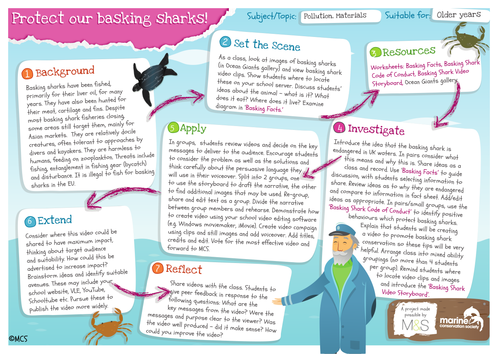21Uploads
5k+Views
2k+Downloads
Elementary science

Lifecycle of a Turtle
A visual PDF information sheet illustrating the lifecycle of marine turtles, including brief descriptions of the stages of mating, nesting, hatchlings, growing up, and the lost years. Each life stage is numbered and accompanied by a description, and are all placed around a central image of a turtle.

Litter in the environment
Using this lesson, students will experience litter in the environment first-hand by taking part in a litter survey.
Results will then be analysed, looking at the sources and properties of litter, considering how it could reach the sea, and learning how impacts the environment.
Includes fact file to support teaching, activities, survey worksheet, health and safety guidance, and links to follow-up learning.
Linked to national curriculum in England, Curriculum for Excellence in Scotland, Curriculum for Wales, and Eco-Schools topics.
Lesson 4 in Marine Litter series: https://www.mcsuk.org/what-you-can-do/fun-learning/primary-learning/teaching-resources/ks2-p7/marine-litter/#4-litter-in-the-environment

Life in the deep
In this activity-led session students will discover some of the weird and wonderful animals living in the deep sea, and how they have adapted to the harsh conditions.
Activities include paired work, class scientific observation, group measuring exercises and analysing images. At the end of the lesson, students can design their own deep sea creature to include the adaptation features covered.
Includes fact file to support teaching, deep sea image reel, giant creature cards, and links to follow-up learning.
Linked to national curriculum in England, Curriculum for Excellence in Scotland, Curriculum for Wales, and Eco-Schools topics.
Lesson 4 in the Amazing Ocean series: https://www.mcsuk.org/what-you-can-do/fun-learning/primary-learning/teaching-resources/ks2-p7/amazing-ocean/#4-life-in-the-deep

Grouping animals
Working in small groups, students will learn about and sort animals by their features and characteristics.
By the end of the activity, students will be able to define invertebrates and vertebrates, and name and describe characteristics of marine mammals, reptiles, birds and fish.
Includes image cards for matching and sorting game, worksheets, and links to follow-up learning.
Linked to national curriculum in England, Curriculum for Excellence in Scotland, Curriculum for Wales, and Eco-Schools topics.
Lesson 7 in the Amazing Ocean series: https://www.mcsuk.org/what-you-can-do/fun-learning/primary-learning/teaching-resources/ks2-p7/amazing-ocean/#7-grouping-animals

Protect Our Basking Sharks
Suitable for: Key Stage 2
Timing: This Learning Outline is designed to be split into several lessons depending on the age and ability of students as well as the length of lessons.
Curriculum Links:
English - Talking and Listening, Reading
Computing
Science
About the activity
An introduction to the biggest fish in our sea and the second biggest in the world, the Basking Shark. Students will use resources from our Cool Seas Explorer Centre Online classroom (Ocean Giants section) available at www.mcsuk.org/coolseas, to investigate why Basking Sharks are endangered. In groups they will then produce a short film using digital software (e.g. Windows Moviemaker, iMovie) to promote Basking Shark conservation. The best video should be shared with MCS at education@mcsuk.org with details of the class and school. If possible student films should also be shared on school social media pages to share the learning with a real audience.
For other free teaching resources visit www.mcsuk.org/coolseas.

Tremendous turtles
Did you know that leatherback turtles are found here in the UK?
In this lesson, students will learn about biology, migration patterns and conservation of sea turtles. They will manipulate and present scientific data, increase their map skills, and develop their reading and writing skills.
Includes fact file to support teaching, image reel, species fact cards, worksheets, videos, and links to follow-up learning.
Linked to national curriculum in England, Curriculum for Excellence in Scotland, Curriculum for Wales, and Eco-Schools topics.
Lesson 9 in the Amazing Ocean series :https://www.mcsuk.org/what-you-can-do/fun-learning/primary-learning/teaching-resources/ks2-p7/amazing-ocean/#9-tremendous-turtles

The plastic plague
Plastic waste impacts our marine environment in a number of ways.
In this lesson, students will sort litter items into their raw materials, look into properties and degradation times of various litter items and consider the effects this has on the environment.
They’ll also create a fair test, develop a hypothesis, observe changes, record date and draw conclusions.
Includes fact file to support teaching, Litter Timeline activity, investigation worksheet, and links to follow-up learning.
Linked to national curriculum in England, Curriculum for Excellence in Scotland, Curriculum for Wales, and Eco-Schools topics.
Lesson 3 in Marine Litter series: https://www.mcsuk.org/what-you-can-do/fun-learning/primary-learning/teaching-resources/ks2-p7/marine-litter/#3-the-plastic-plague

Small and Awesome UK Creatures
A PDF resource matching up a detailed image of different underwater creatures found in the UK with their names on the second page, including different species of jellyfish, starfish, and anemones.

Rockpool Explorer - Outside
Rockpools are fascinating environments to explore. This lesson involves taking your class on a trip to local rockpools.
Students will focus on habitat conditions, adaptations and grouping animals.
This lesson provides pre- and post-activities to increase learning opportunities.
Includes fact file to support teaching, rockpool image reel, rockpool spotter sheet, seashore code, video, worksheet, and links to follow-up learning.
Linked to national curriculum in England, Curriculum for Excellence in Scotland, Curriculum for Wales, and Eco-Schools topics.
Lesson 5 in the Amazing Ocean series: https://www.mcsuk.org/what-you-can-do/fun-learning/primary-learning/teaching-resources/ks2-p7/amazing-ocean/#5-outdoor-rockpool-explorers

Rockpool Explorer - Inside
Bring the seaside to the classroom through a virtual rockpool exploration.
Students will study these fascinating habitats, exploring the conditions and adaptation features and begin to group animals.
Includes fact file to support teaching, rockpool image reel, rockpool spotter sheet, video, worksheet, and links to follow-up learning.
Linked to national curriculum in England, Curriculum for Excellence in Scotland, Curriculum for Wales, and Eco-Schools topics.
Lesson 6 in the Amazing Ocean series: https://www.mcsuk.org/what-you-can-do/fun-learning/primary-learning/teaching-resources/ks2-p7/amazing-ocean/#6-indoor-rockpool-explorers










